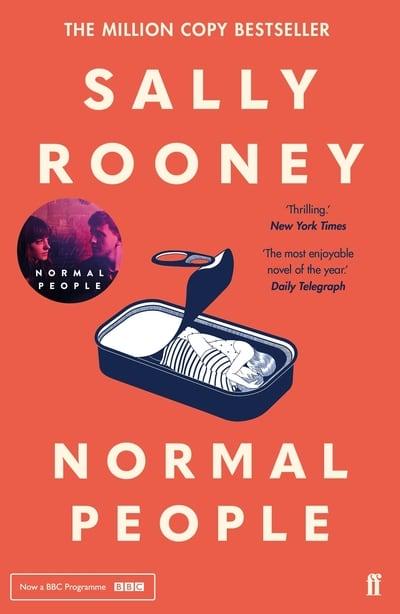Book Review of Sally Rooney's Normal People

I first read and enjoyed Sally Rooney’s Normal People a few months ago. I remember thinking the level of the self-reflection and introspection by the main characters, Marianne and Connell were intense. Somehow it put me in mind of Simone de Beauvoir’s She Came to Stay.
Both books are love stories (of a kind) and both deal with the complexity of emotions resulting from attraction, envy and faithlessness. Beauvoir’s book is autobiographical, it was written as an act of revenge against a 17 year old who came between her and Sartre, with whom she was involved. Sally Rooney’s Normal People isn’t autobiographical. In an interview for the Irish times she states ““it’s not autobiographical . . . but I did feel that as characters, as people, their psychology was very much drawn from facets and aspects of my own psychology as a younger adult and even now” (Rooney, 2020).
Normal People traces the relationship of Marianne with Connell as they move from their small town in the West of Ireland to university and finally to Connell accepting a place on a creative writing course in New York. Marianne is wealthy, middle class and intellectually snobby; Connell is sporty, bright but considered ‘the wrong sort of person’ for a match to be possible between them.
The book’s focus is almost completely on the dynamic of Marianne and Connell’s relationship. Who they are and the influence of nature and nurture in determining their relationship is never far from the surface of the text. Domestic abuse, bullying, parenting, class, wealth are all topics that are explored and are all used, in part, to explore not only the emotional relationship of the two characters, but also the sexual relationship between them.
I can see why Normal People has such appeal for young people in particular. What I particularly found intriguing about it is how the text is structured. The chapter headings are dates at which key events occur and several months pass between the beginning of a new chapter. This often reflects a period of time during which Connell and Marianne were ‘seeing other people’ or not in the same physical location. The reader often learns about a change in the relationship and then a flashback approach is used to show how the current status quo of that particular chapter occurs. (Does that even make sense?!) Consequently, there is a kind of series of mini flashbacks that I imagine are used when dividing up the book for the BBC Three TV series. which stars Daisy Edgar Jones and Paul Mescal in the roles of Marianne and Connell.

Book Discussion Questions on Sally Rooney's Normal People
- If you were Connell’s mum, Lorraine, how would you have reacted to Connell not taking Marianne to the school prom?
- Marianne described herself as a ‘submissive’ to Jamie and enjoys being physically hurt during sex. Discuss how, as readers, you responded to this? What amateur psychologist conclusions did you draw as you read the story?
- What adjectives would you use to describe Connell?
- What adjectives would you use to describe Marianne?
- Which character in the book do you both most like and dislike? Discuss the reasons for your opinion.
- Why do you think Marianne got involved with Jamie?
- Do you think Connell would have had a happier life if he had married Rachel? Discuss the reasons for your opinions.
- What do you think would happen in a sequel to Normal People?
- Do you think an older novelist could have written Normal People? Why or why not?
- Are Marianne and Connell normal people? Why or why not?
- What do you think is the basis of the attraction between Marianne and Connell?
- Discuss Eric’s suicide in relation to what you know about mental health issues.
Bookclub Questions on Sally Rooney's Normal People (if you haven't read the book!)
- To what extent are you discussing very private ‘sexual issues’ with your children?
- Nothing ever quite lives up to first love. Discuss.
- Marianne and Connell had very different university experiences? Discuss your own life experiences of being in your early twenties.
- In Normal People Marianne says “You learn nothing very profound about yourself about simply being bullied; but by bullying someone else you learn something you can never forget.” Discuss this quote in relation to your own life experiences.
- Connell was a popular kid at school, yet struggled to settle in at university. Marianne, on the other hand, was able to make friends at university relatively easily. How important do you think the need to be popular is?
Personal Response to Sally Rooney's Normal People
I am an avid fan of the Fortunately podcast, available on BBC Sounds. When hearing Jane Garvey and Fi Glover discussing the serialization on their podcast, I thought I would watch it with my grown up girls. When I mentioned this to them though they’d already seen it. I think the knowledge that it had a lot of ‘sex scenes’ was incentive to not watch the programme with their old mum!
Not to be put off, I started watching the series anyway. however only watched the first half of one episode before deciding that the series wasn’t for me. I simply couldn’t be doing with the intensity of all that exploration of first love. If I’m honest, I felt a little bit the same when I read David Nicholls’ One Day. It was great, but I wouldn’t have wanted to watch it on screen. One of these days I’ll need to reflect why I am open to reading about teenage angst and first love, but not viewing it. I am tempted to revisit She Came to Stay and see how I respond to that. (Perhaps I’ll have to add to the list of ways that I know I am middle aged!) For now though I’ll finish by saying I definitely would recommend Sally Rooney’s Normal People, but there are aspects of it that I found uncomfortable to read.